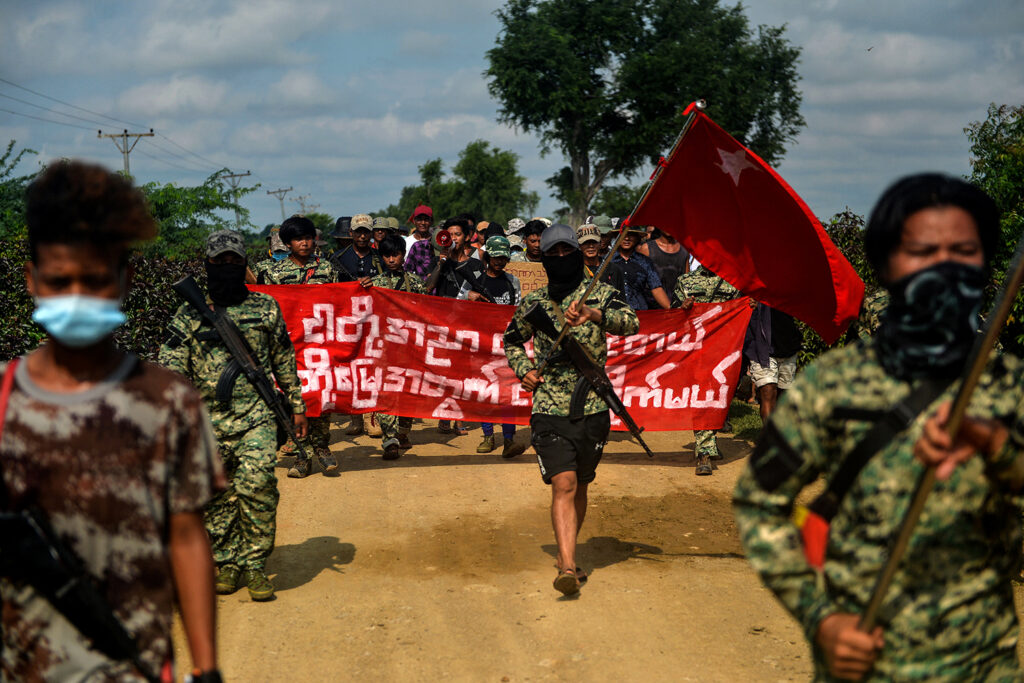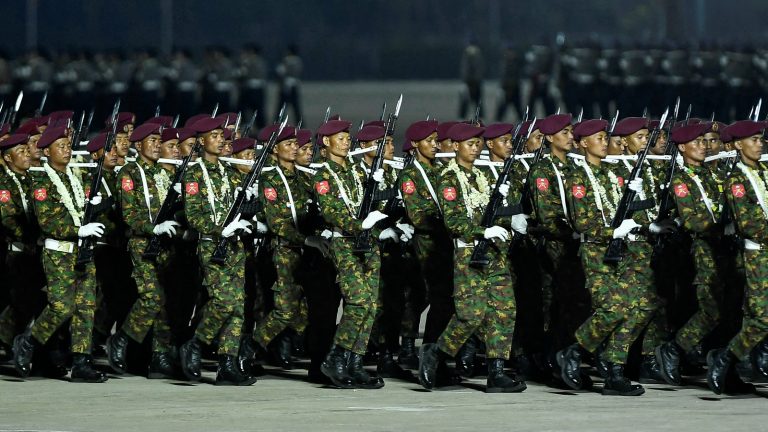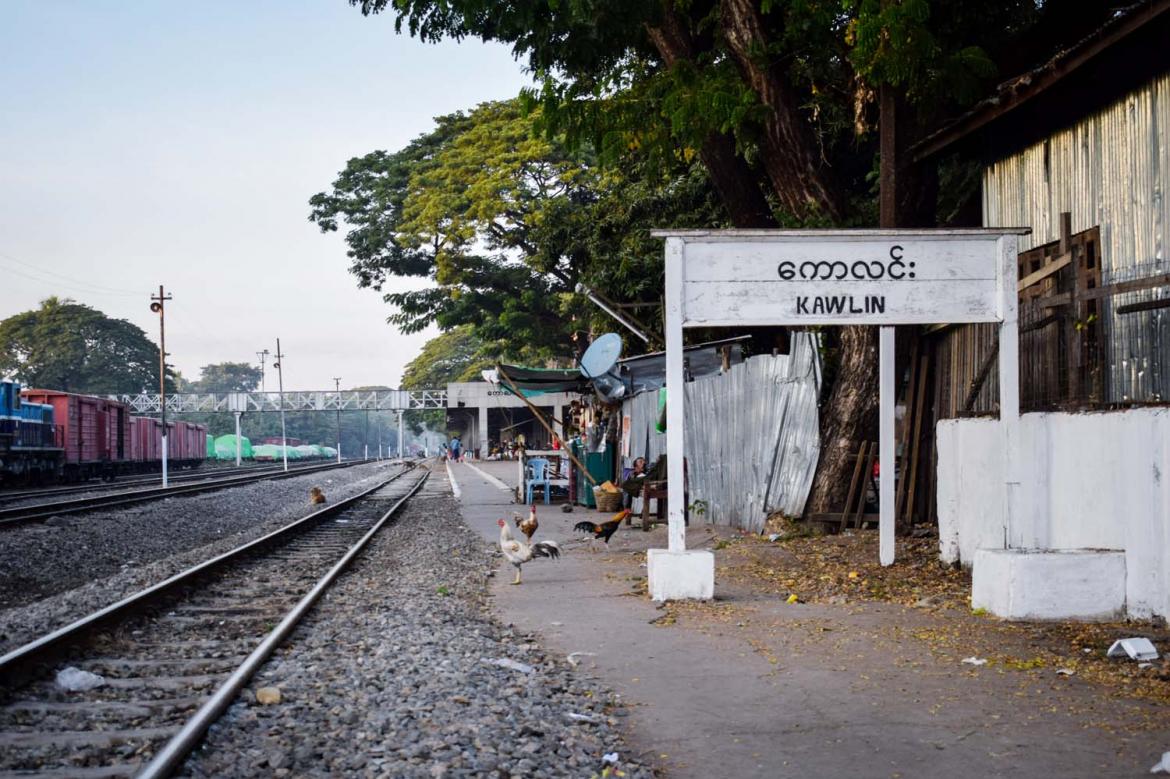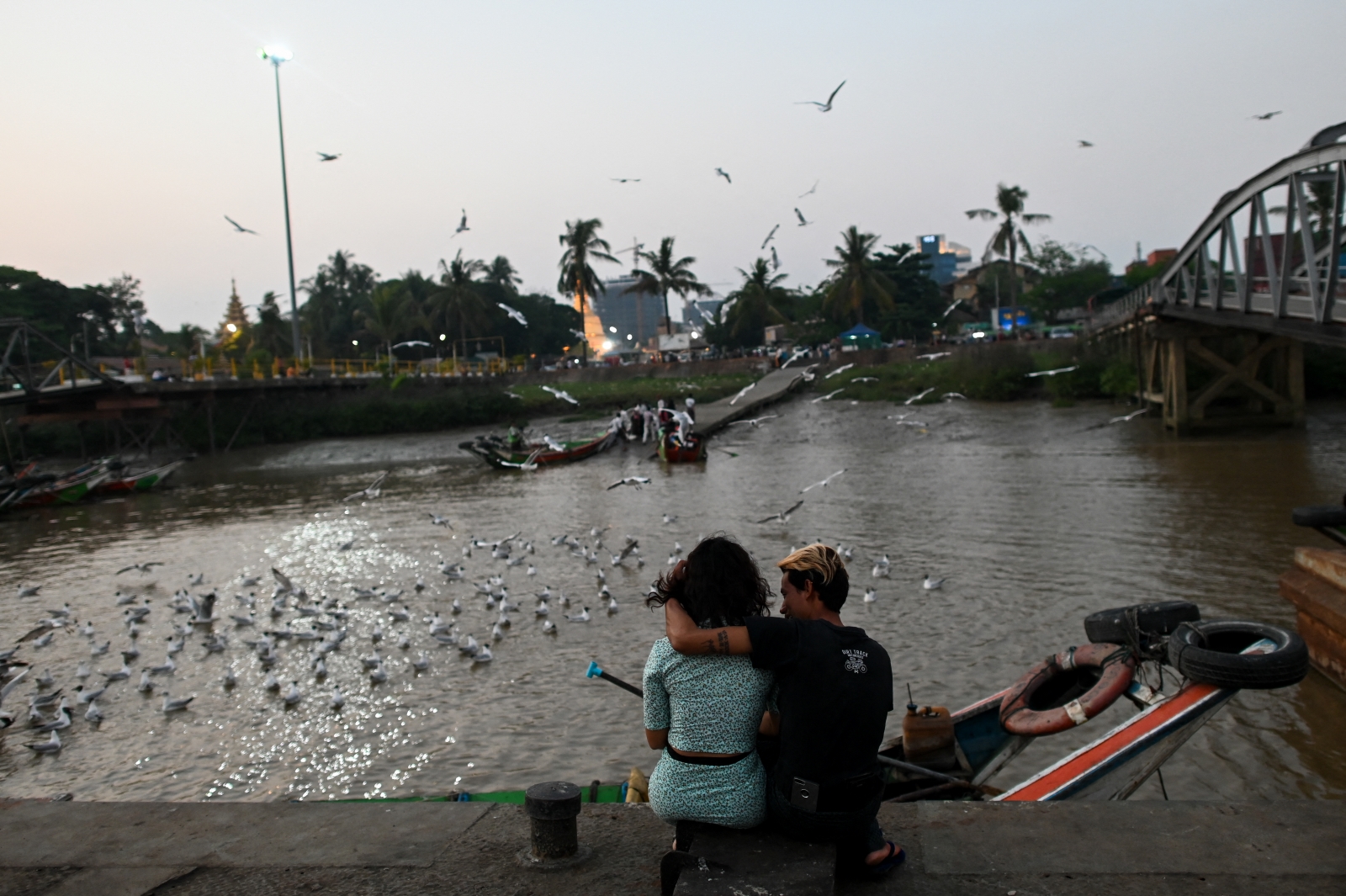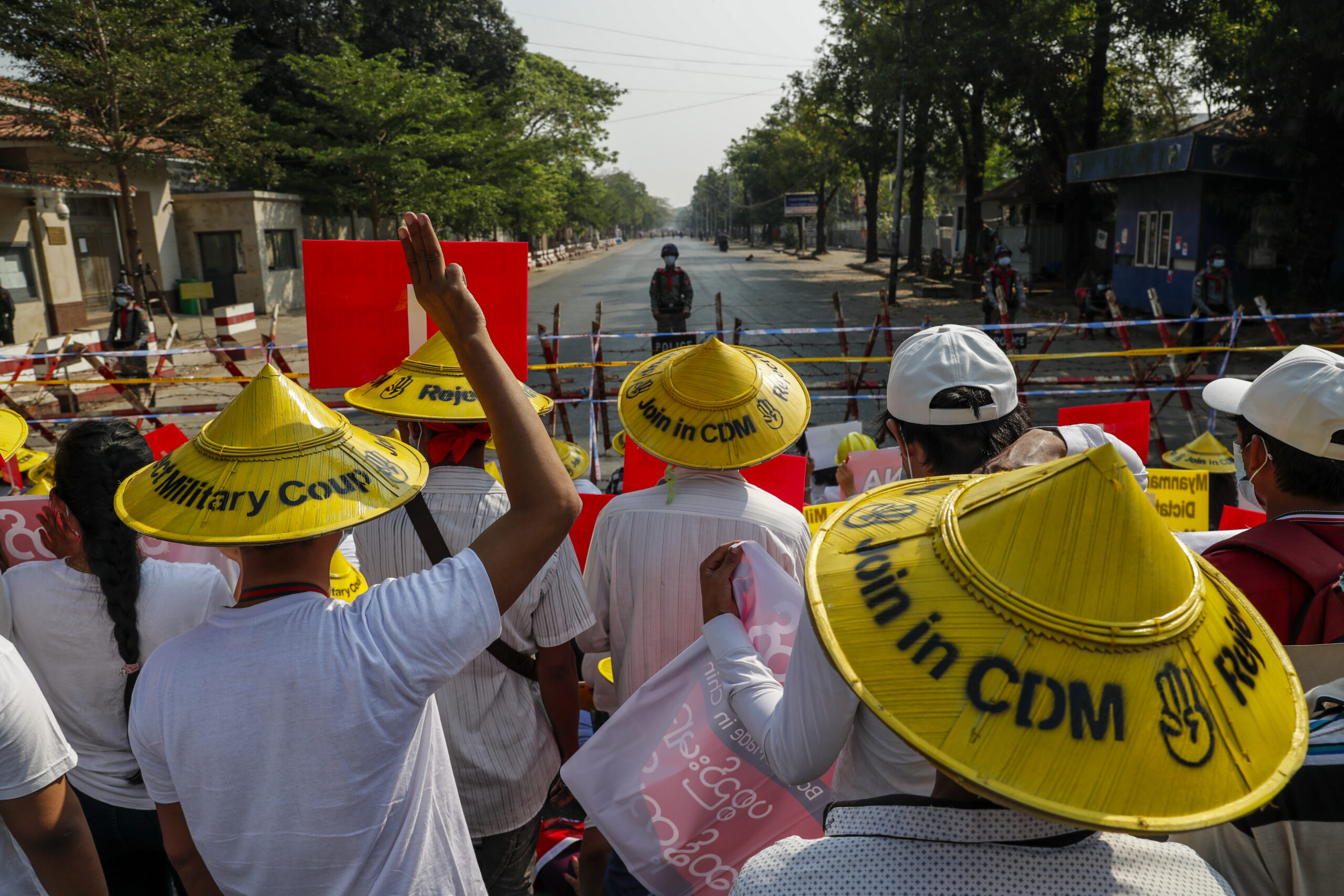As regions like Sagaing plunge deeper into the chaos of Myanmar’s post-coup conflict, cases of sexual violence by both sides are on the rise and victims have few avenues to seek redress.
By FRONTIER
In August last year, seven young people were detained by local residents while scavenging in a Sagaing Region village that had been abandoned following a raid by the Myanmar military. Days later, all seven were dead, and the women and girls allegedly raped.
“Two of those who were raped were underage. It’s terrible,” said Ko Hla Sein* a member of the Chaung-U People’s Defence Force.
Since the military coup and brutal crackdown on peaceful protests in 2021, armed groups opposed to the junta have sprouted across the country. The Tatmadaw has used familiar tactics to quell dissent, including massacres, airstrikes and sexual violence.
But in this case in Chaung-U, the alleged perpetrators were not from the Myanmar military but a militia under the authority of the National Unity Government, the parallel pro-democracy administration appointed by elected lawmakers deposed in the coup. According to Hla Sein, the scavengers were handed over to the NUG-affiliated local People’s Defence Team soon after they were detained.
“After the arrest, the township administration found that these youths were from [Pe Ku Toe] village in Sagaing Township, so we tried to contact their village,” Hla Sein told Frontier. But the situation soured when a rumour went around that one of the captives was related to a soldier.
Rather than sending them home, the PDT allegedly raped the four women and girls before executing all seven. Hla Sein said the female victims were aged 15, 16, 19 and 20 while the males were 15, 16 and 26.
Local sources in Sagaing say sexual violence by the military and resistance is on the rise, with the NUG either unwilling or unable to control and punish its forces. Meanwhile, social stigma – and the fact that justice is often delivered by the very armed groups accused of committing crimes – means many cases are likely going unreported.
In a statement released on May 4, the NUG acknowledged that seven victims “purported to be intelligence personnel from the terrorist military council” were “unlawfully killed” in August. It did not mention the alleged sexual violence.
The statement says the NUG’s women’s affairs ministry started “working on the case” immediately after receiving a complaint in January this year, alongside the defence, justice and home affairs ministries.
Hla Sein said a complaint was first filed to the NUG-affiliated township administration soon after the incident, but no action was taken, so they escalated to contacting ministries in January. But the NUG didn’t comment on the case until after people like Hla Sein, disgruntled with the lack of action on the case, leaked the story to the media.
While the NUG statement said four PDT suspects were arrested in September, Hla Sein says they were only held briefly.
“After just one month, the PDT members who committed the killings were released and told to go back to their positions without punishment. Nearly eight months have passed now, and no action has been taken against them,” Hla Sein told Frontier in April.
Frontier repeatedly sought comment from members of the NUG-affiliated township administration, the NUG’s official spokesperson and members of its justice and defence ministries, but they did not respond.
‘Anyone who commits rape is a criminal’
The alleged rapes in Chaung-U are far from an isolated incident in Myanmar’s long-running conflicts.
For decades, the Myanmar military has been infamous for its use of sexual violence on civilians in its wars against ethnic armed organisations, as denounced by Shan Human Rights Foundation and Shan Women’ Action Network in the 2002 landmark report License to Rape.
More recently, the United Nations’ Independent International Fact-Finding Mission on Myanmar found in 2019 that “sexual and gender-based violence was a hallmark of the Tatmadaw’s operations” during its brutal crackdown on the Rohingya population and war against the Kachin Independence Army. In 2018, the military allegedly raped and murdered six female medics from the Ta’ang National Liberation Army.

Sagaing, in central Myanmar, had largely been free from conflict for decades. But according to several people interviewed by Frontier, sexual violence against women has become almost a routine occurrence in the region since the coup, where the fighting between the Tatmadaw and resistance forces is particularly fierce.
While they say the Tatmadaw is the worst perpetrator, they also cited an alarming rise in sexual violence by resistance forces. This is in direct violation of the Military Code of Conduct issued by the NUG in 2021.
“Before, sexual violence was only committed by the military. Now, revolutionary fighters are doing it too,” said Ma Daisy*, who works for an organisation documenting human rights violations in Sagaing. Her team travels the region, meeting with armed resistance forces, nonviolent activist committees and ordinary residents.
Due to the sensitivity of its work and fears of retaliation from both the Tatmadaw and the resistance forces, Ma Daisy requested Frontier to withhold her name and that of her group.
Between January 2022 and April this year, Ma Daisy’s organisation has documented five cases of sexual violence in Sagaing by resistance forces – both independent and under the nominal authority of the NUG – including the incident in Chaung-U. Meanwhile, they have documented 20 such cases at the hands of the Tatmadaw in the same period.
Both Ma Daisy and ordinary Sagaing residents interviewed by Frontier said the number of sexual assaults committed by resistance forces and the military is likely far higher.
“It’s difficult to document rape cases in conflict areas,” said Ma Thinzar Shunlei Yi, a human rights activist and member of the feminist collective Sisters2Sisters. “It’s difficult for victims to talk about the incidents if they aren’t in a safe environment.”
Ma Daisy said it shouldn’t matter if a perpetrator is from the military or a resistance group.
“Anyone who commits rape is a criminal. They are the same. The most important point is to take action against the perpetrators,” she said.
In another incident in September last year, Ma Daisy said the leader of an armed group under NUG command raped one of his 23-year-old female subordinates, Ma Mar Lar Wai*.
“This guy raped a comrade from the revolutionary forces… The PDT leader used his power to commit a rape because he had a gun in his hand. This kind of action is similar to the Myanmar military,” she said, claiming the perpetrator threatened to kill Mar Lar Wai if she didn’t keep quiet.
Instead, she fled to another township, where she reported the incident to Ma Daisy’s organisation.
Little redress for victims
According to Ko Kyaw That*, an anti-junta activist in Sagaing, discrimination against women and social stigma plays a role in preventing many victims of sexual violence, be it by the Tatmadaw or resistance forces, from filing complaints against their attackers.
“Some villagers blame the victims, because in some cases they are no longer virgins. No man will marry them, so many victims stay silent and don’t speak out and never get justice,” he explained.
In another incident documented by Ma Daisy’s group last year, a married woman was allegedly raped by a Tatmadaw soldier during a raid, and she became pregnant.
“It caused huge problems for her,” said Ma Daisy, who claimed the woman’s husband and other members of the community shunned her after the incident.
Even victims who are willing to speak out have few avenues to seek redress. The military has long practiced sexual violence with impunity, and resistance forces have little ability to hold enemy soldiers accountable, for now.
“We will only be able to punish the military after we win the revolution,” said Kyaw Thant.
Meanwhile, justice for perpetrators from resistance forces is patchy at best. People interviewed by Frontier agreed that complaints filed to the NUG’s ministry of justice are often ignored.
Kyaw Thant argued that the NUG is responsible for any violence committed against civilians by fighters under its command. The NUG has made grandiose claims, such as that it controls half of the country, which brings a corresponding expectation of accountability that it seemingly can’t deliver.
“If the NUG controls half of the country, it has a responsibility to deal with these issues,” said Kyaw Thant, who added that he doesn’t believe that claim.
Regardless, he said the NUG’s affiliated township administrations should be able to administer justice in “stronghold areas”, like rural parts of Sagaing Region.
“They have very few difficulties in going against military informants. So, it makes no sense to say that they face such big obstacles in taking action against members of their resistance groups who rape women,” he said.
One possibility, said Kyaw Thant, is that the NUG has little effective control over the armed groups nominally under its command. He warned that the lack of action against perpetrators of crimes against the civilian population could become a problem for the resistance in the long run.
“If they don’t take action, those who committed crimes will commit them again and again. And, if more crimes are committed, the people will no longer believe in the revolutionary groups and the PDFs,” he said.
Ma Daisy agrees. “If these rape cases keep happening, the people will think that the military and the resistance are the same, and that’s when the movement against the junta will begin to crumble.”
Thinzar Shunlei Yi said these cases need to be solved “by the law”.
“People need to push the NUG’s courts and the revolutionary groups’ judicial systems to operate better,” she said.
While the NUG is trying to establish a functioning judiciary, in many places the armed groups are still the main arbiters of justice. As a result, victims of sexual violence perpetrated by resistance groups are too afraid to report the incidents.
“In those areas, if an PDT leader commits a crime, its victims have to report the case to him. So, for instance if Mar Lar Wai wanted to file a complaint about the rape she suffered, she would have to go to the same person who raped her and threatened to kill her,” Ma Daisy explained.
“Where is the justice for women who are victims of sexual violence? How can they feel safe?”
*denotes use of a pseudonym for security reasons


